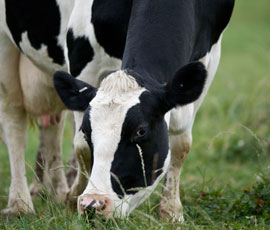Farm minister Jim Paice launches Dairy 2020

Farm minister Jim Paice joined some of the main players in the dairy sector today to launch Dairy 2020, a new initiative that aims to position the British dairy industry as the most sustainable in the world.
Senior dairy industry leaders will be meeting Mr Paice at the House of Commons for the launch of the initiative on Monday (16 April).
Globally, dairy production accounts for 2.7% of the planet’s carbon footprint and the UK dairy industry is under pressure to reduce its impact on the environment.
Dairy 2020 is a collaborative project between organisations across the supply chain of UK dairy, who will be working together to build a sustainable dairy industry that will enable people, the environment and businesses to thrive.
The project, backed by Farmers Weekly, aims to answer the question, “What does a sustainable dairy industry look like, and what contribution can it make to a sustainable world?”
The published outputs of Dairy 2020 include:
- A vision statement that sets out a clear ambition for the industry
- A framework of guiding principles that assists the industry in delivering an integrated approach to sustainability
- A list of areas where focus is needed to enable a sustainable dairy industry to thrive in 2020
- A set of scenarios describing possible futures for the industry in 2020, and key risks and opportunities that the industry may have to operate within in 2020
- A toolkit that helps organisations in the industry to bring the project outputs to life through their individual company strategies and actions.
Mr Paice told those at the launch of Dairy 2020 that he still believed the dairy industry was the backbone of British agriculture.
But he urged farmers and the whole supply chain to grab many opportunities that exist and to embrace change.
He queried why the UK was obsessed with the liquid milk market when it represents only half the dairy product consumed and he urged the dairy sector to follow the expansion of EU competitors.
“Many of the most profitable dairy producers have the lowest carbon footprint. It’s often said that producers can’t afford to be more sustainable. Well I would suggest you can’t afford not to do it,” said Mr Paice.
The minister claimed that many producers managed to be productive and competitive with low yields per cow and lower prices yet were making bigger margins. “It shows there is so much opportunity for the industry to tailor their own business to maximise gain,” he said.
Mr Paice added: “I firmly believe that the British dairy industry can be amongst the best in the world: the most competitive; the most productive and the most sustainable and Dairy 2020 can help achieve this.
“This strategy sets out a clear vision and ambition for the future of the industry, and is a brilliant example of what can be done when an industry works together in a collaborative and positive way.”
“I firmly believe that the British dairy industry can be amongst the best in the world”
Jim Paice, Farm minister
James Neville, chair of Dairy 2020, added: “We have worked together to define what a sustainable dairy industry will look like and what role it has in a future world.
“We believe a sustainable dairy industry is one which is vibrant and which enables people, environment and business to thrive”.
Before Dairy 2020, Mr Neville said there was a lack of integrated strategy in place in the UK dairy industry. The biggest symptom of this is the country’s annual dairy trade deficit of £1.2bn.
“Through Dairy 2020 and the world-leading Dairy Roadmap, we now have the platform to deliver a sustainable future for the British dairy industry in all respects: environmental, social and economic,” he added.
“Going forwards we now want to engage with the rest of the supply chain to build commitment with leaders in all commercial operations, associations, representative bodies and NGOs.”
The initiative has been 18 months in the making and has been created by stakeholders from across the supply chain including farmers, retailers, banks, processors, policy-makers, NGOs, government and trade bodies.
The project has been managed and facilitated by Forum for the Future, the leading global sustainable development non-profit organisation.
Farmers Weekly editor Jane King said: “Dairy 2020 is taking a holistic approach to sustainability because currently, despite the plethora of excellent initiatives, there is no sense of a coherent future vision for the industry, and it is often forced into a reactive position on critical issues.
“There is a real need for the dairy industry to articulate why it is such an important industry in the UK, and what positive impacts a thriving, sustainable industry could have on the country’s economy, health and landscape.”
Join our forum debate and tell us what you would like to see the dairy industry do by 2020.
